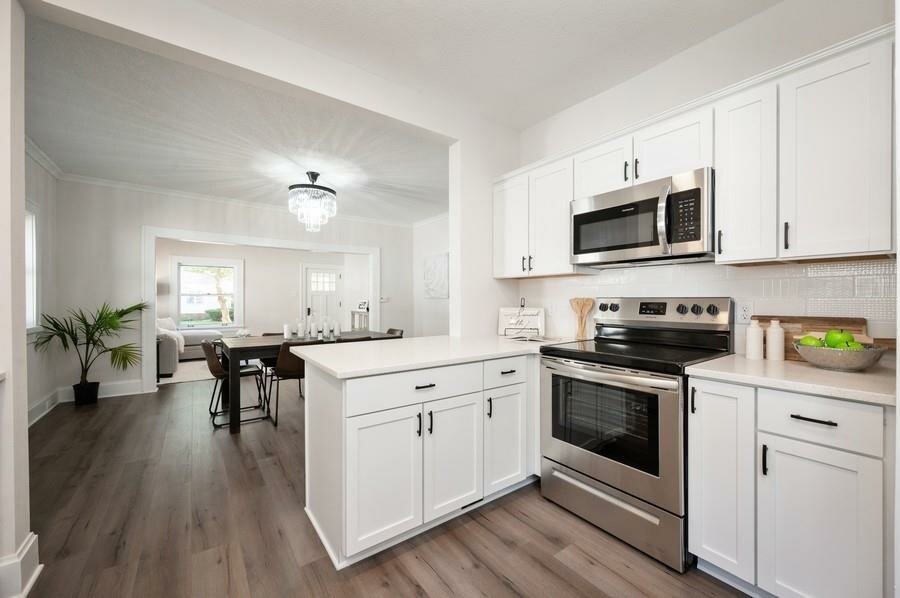How Rising Tariffs Affect Home Sale in Des Moines
As global trade rules move and geopolitical tensions mount, many homeowners are concerned how these developments will affect the local property market, giving them an advantage . If you’re thinking about selling a home in Iowa’s capital, one pressing question is whether rising tariffs would have an impact on your Des Moines home sale and overall experience.
Understanding how macroeconomic factors such as tariffs affect the real estate market can give homeowners an advantage in making informed decisions. While tariffs are typically linked with the cost of imported goods, they are often aimed at protecting domestic industries or addressing geopolitical challenges. However, their rippling effects can have a subtle impact on many elements of the housing business, including home development, remodeling, and higher costs related to general market confidence.
Introduction to the Des Moines Housing Market
The Des Moines housing market has experienced significant fluctuations in recent years, with changes in interest rates, construction costs, and housing supply affecting the industry. As a major city in Iowa, Des Moines has a unique market that is influenced by both local and national factors. To stay informed about the housing market, it’s essential to have access to the latest information and data. Unfortunately, your browser is not supported, so to get the best experience on desmoinesregister.com, please upgrade your browsers for the best experience to one of these browsers: Google Chrome, Mozilla Firefox, Opera, Microsoft Edge, or Safari.
What Are Tariffs and Why Do They Matter?
Tariffs are tariffs levied on imported goods that are typically intended to promote home production and lessen dependency on foreign products. When a government adds tariffs, the cost of importing items rises, affecting the pricing and availability of a wide range of products, including appliances and building materials. This can lead to an increase in domestic production of materials like steel and aluminum, which may help stabilize prices in the long run but could also result in short-term cost increases for housing projects.
Tariffs are meant to protect local industries; however, they can have unforeseen implications for consumers and businesses. For Des Moines homeowners, these implications might manifest as increased costs, longer project times, and decreased buyer enthusiasm.
How Rising Tariffs Influence Home Construction Costs
Rising tariffs have a significant impact on Des Moines house sales, particularly in terms of construction and renovation costs. Many building materials—including lumber, imported steel, aluminum, and other manufactured components—are imported from various countries. For example, tariffs raise the cost of these materials.
Builders with increased expenses frequently pass the costs on to homeowners. Even in the resale market, if homeowners have just completed renovations with imported materials, they may need to raise their listing prices to cover the costs, despite technology making it faster to sell. Unfortunately, this might make homes less appealing to prospective buyers, especially in a price-sensitive market.
The Impact on Home Renovation and Pre-Sale Improvements
Before listing their house for sale, many sellers make minor modifications or cosmetic updates to increase its attractiveness and value. However, rising tariffs can raise the cost of these pre-sale improvements, reducing the ability of homeowners to make these updates and contributing to further price increases.
Higher prices on imported goods can discourage homeowners from updating kitchen appliances, installing new flooring, or upgrading plumbing fixtures. This may result in homes entering the market with outmoded features or a decreased perceived worth, affecting both buyer interest and final sale price, similar to how browsers for the best experience can impact online shopping.
Effects on Buyer Behavior in Des Moines
Rising tariffs also have an indirect impact on consumer confidence, which is a big factor in Des Moines house sales. When tariffs raise prices across the board—not just in property, but in daily goods—buyers may become more cautious about their spending due to the economic instability.
In uncertain economic situations, prospective homebuyers may postpone purchases, cut their budgets, or opt to rent instead. This behavioral shift may lead to fewer offers, more time on the market, and potentially lower sale prices.
Home Prices in Des Moines
Home prices in Des Moines have continued to rise slightly in recent years, with the average price for a home increasing due to higher costs of construction materials, such as imported steel and aluminum. The aluminum tariffs imposed by the government have led to higher prices for aluminum imports, which are used in various industries, including construction and manufacturing. Domestic producers have taken advantage of the situation, increasing their prices while still undercutting international suppliers. As a result, homebuyers in Des Moines are facing higher prices, making it more challenging for them to purchase homes.
Regional Housing Market Trends
The regional housing market trends in Des Moines are influenced by various factors, including the economy, interest rates, and construction costs. The city’s housing market is expected to experience a slowdown in the coming years due to uncertainty and fluctuations in the economy. The tariffs imposed on imported steel and aluminum have led to higher construction costs, which are being passed on to homeowners and buyers. The dynamics of the housing market are shifting, with builders and consumers adjusting to the new reality. The surge in prices of construction materials has made it more expensive to build homes, leading to a reduction in new construction projects.
Supply Chain Disruptions and Inventory Challenges
Tariffs can also cause supply chain disruptions, particularly as part of larger geopolitical conflicts or trade wars. For instance, tariffs on materials imported from Canada, a significant supplier of softwood lumber and other construction materials, can escalate costs for homebuilders. These disruptions can cause delays in new home building, renovation projects, and inventory shortages, ultimately affecting home prices.
In Des Moines, where housing demand has been stable, a drop in new house availability as a result of these interruptions might have a wide-ranging impact on the market. While fewer new homes may appear to be a good thing for resale properties, a limited supply can cause prices to rise unevenly, thereby pricing out some buyers and skewing market dynamics, making it a site to take advantage of the current situation.
Local Market Resilience and Economic Factors
Des Moines’ economy is reasonably stable when compared to other U.S. cities, having strengths in insurance, finance, agriculture, and education. These industries contribute to a sustained demand for homes. However, even a strong market is not immune to national and worldwide economic changes.
Tariffs that raise costs across sectors, particularly those critical to the Des Moines economy, may result in job uncertainty or reduced disposable income, weighing on the housing market. Protectionist policies aimed at safeguarding American jobs by shielding domestic industries from foreign competition can have unintended consequences, including job losses in other sectors and increased costs for consumers and businesses.
Mortgage Rates and Financing Options
While tariffs do not have a direct impact on mortgage rates, the economic uncertainty they produce can influence Federal Reserve interest rate decisions. If inflation rises due to increasing import costs, as economists suggest, the Fed may raise interest rates to slow the economy. These market conditions can lead to higher mortgage rates, which can limit buyers’ purchasing power, putting downward pressure on property prices.
Another important factor influencing home sales in Des Moines is the interaction of rising tariffs, inflation, and interest rates. Sellers may discover that, even in a high-demand market, purchasers have less budgetary room than expected. Understanding these market conditions is crucial for stakeholders to effectively navigate pricing strategies and anticipate changes in home sales and inventory.
Staying Informed about the Housing Market
To stay informed about the housing market in Des Moines, it’s crucial to have access to the latest data and information. Desmoinesregister.com wants to ensure the best experience on desmoinesregister.com for all its readers, so we built our site to take advantage of the latest technology, making it faster and easier to use. However, to get the most out of the site, you need to use a supported browser. We recommend using one of the following browsers: Google Chrome, Mozilla Firefox, Opera, Microsoft Edge, or Safari. By staying up-to-date with the latest news and trends, homeowners, buyers, and industry professionals can make informed decisions and navigate the complex housing market in Des Moines.
Preparing to Sell Amid Tariff-Driven Uncertainty
Homeowners planning to sell in Des Moines must be prepared for the potential consequences of higher tariffs on residential properties. Here are some strategies to consider that were built to adapt to changing market conditions :
- Price Strategically: Collaborate with a qualified local real estate agent to price your home competitively. Be mindful of how higher expenses elsewhere may effect shopper budgets.
- Highlight Value: Emphasize energy efficiency, high craftsmanship, and recent renovations that are less likely to be affected by tariffs. This might help your home stand out in a crowded marketplace.
- Time it Right: Keep an eye on local inventory movements as well as broader economic factors. Listing your home during a time of low inventory or economic optimism may produce better results.
- Consider Pre-Inspections: With buyer caution on the rise, a pre-listing house inspection will help you solve any possible issues before they become a problem, giving prospective buyers piece of mind.
- Stay Informed: Follow trade policy, interest rate trends, and market shifts to make informed judgments as a seller.
Conclusion
While it may be unlikely that foreign trade policies can influence your home sale, macroeconomic forces have a way of trickling down to local markets. Rising tariffs have an impact on Des Moines house sales by influencing building costs, renovation expenses, buyer behavior, and market confidence. These tariffs are predicted to add thousands of dollars to the price of new homes, affecting affordability for potential buyers.
Staying informed and collaborating with real estate professionals can help you negotiate these challenges. Even in the face of global economic uncertainty, you may still sell your property successfully if you have the right approach and timing.
Call Us Now at 515-305-2803 or fill out the quick form below to get started.
We’ll Make You An Offer Within 24 Hours.
You Decide If It’s A Fit or Not. It’s That Easy And Stress-Free
Fill out the quick form below to get an offer on your house TODAY!
Get Started Now…
We buy houses in ANY CONDITION in Iowa. There are no commissions or fees and no obligation whatsoever. Start below by giving us a bit of information about your property or call 515-305-2803…

